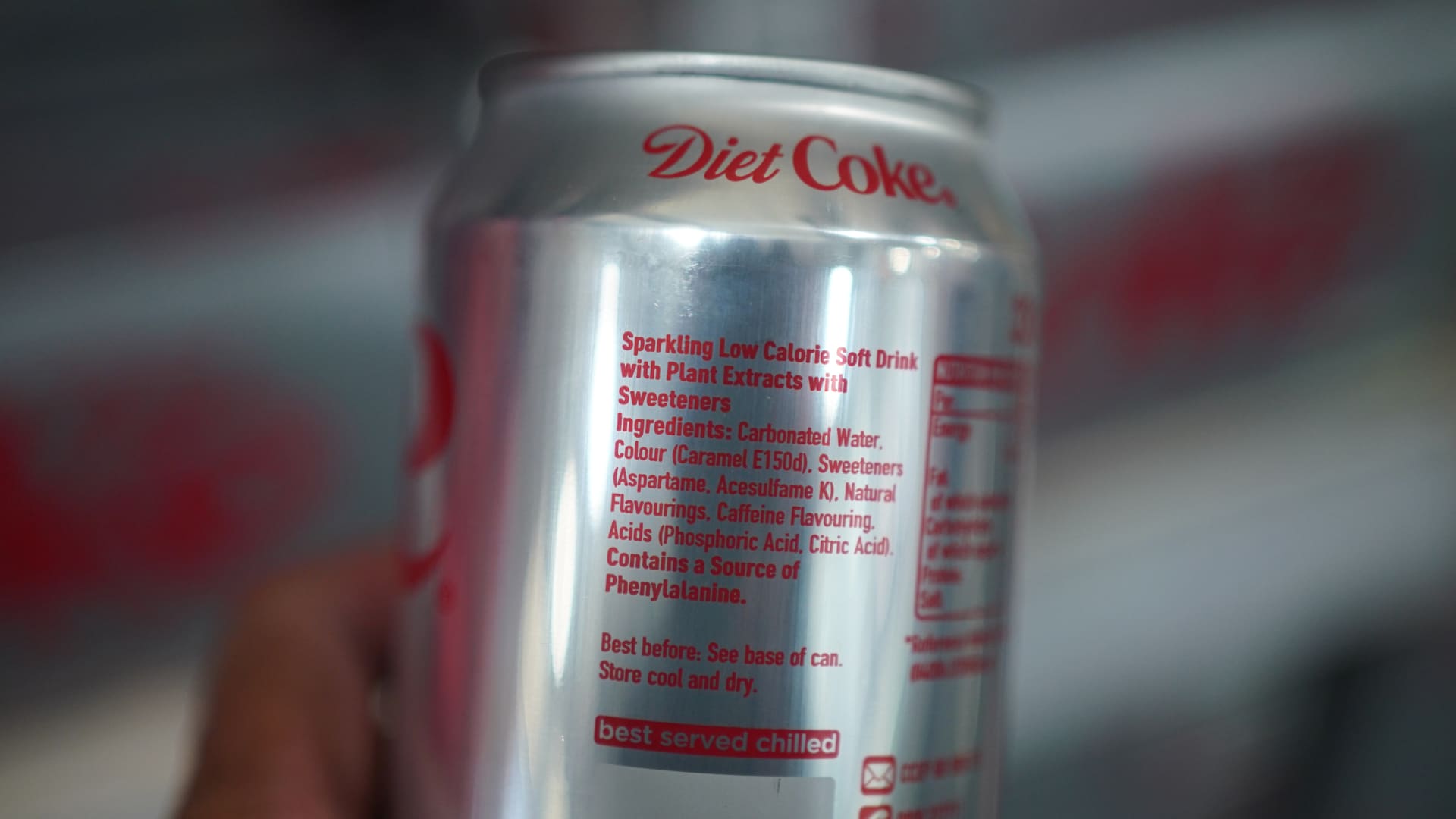The World Health Organization on Thursday classified the soda sweetener aspartame as a possible carcinogen, but said it is safe for people to consume within the recommended daily limit.
The International Agency for Research on Cancer, a WHO body, identified a possible link between aspartame and a type of liver cancer called hepatocellular carcinoma after reviewing three large human studies conducted in the U.S. and Europe that examined artificially sweetened beverages.
Aspartame is used in Diet Coke, Pepsi Zero Sugar and other diet sodas, as well as some chewing gum and various Snapple drinks. Artificially sweetened beverages have historically been the biggest source of exposure to aspartame, according to Lancet Oncology.
Dr. Mary Schubauer-Berigan, a senior official at IARC, emphasized that the classification of aspartame as a possible carcinogen is based on limited evidence. The three studies could have been influenced by chance, bias or other flaws, Schubauer-Berigan noted. More research is needed to determine whether consumption of the artificial sweetener can actually lead to cancer, she said.
“This shouldn’t really be taken as a direct statement that indicates that there is a known cancer hazard from consuming aspartame,” Schubauer-Berigan told journalists during a press conference Wednesday before the findings were released to the public.
“In our view, this is really more a call to the research community to try to better clarify and understand the carcinogenic hazard that may or may not be posed by aspartame consumption,” Schubauer-Berigan said.
How much is too much?
The Joint Expert Committee on Food Additives said Thursday the current evidence supporting a link between aspartame and cancer in humans is not convincing. JECFA is an international group of WHO and U.N. scientists that makes recommendations on how much of a product people can safely consume.
JECFA said Thursday that aspartame is safe to consume if a person’s daily consumption of the sweetener does not exceed 40 milligrams per kilogram of body weight during their lifetime. The U.S. Food and Drug Administration’s recommended daily limit is slightly higher, at 50 milligrams of aspartame per kilogram of body weight.
Depending on their weight, the average adult would have to drink nine to 14 cans of aspartame-containing soda such as Diet Coke daily to exceed the limit and potentially face health risks, said Dr. Francesco Branca, who heads the WHO nutrition and food safety division, during the press conference Wednesday.
Someone who drinks a can of soda now and then or occasionally chews gum that contains aspartame does not need to worry about a health risk, Branca said. The WHO is simply recommending that people use moderation when consuming foods or beverages that contain aspartame, he said.
Branca cautioned that children who consume soda sweetened with aspartame could exceed the daily limit by drinking just three cans. He said children who start consuming aspartame early in life may face a heightened health risk later, though more research is needed on lifelong exposure.
“You may have families that instead of having water on the table, have a big can of sparkling drinks with sweeteners. That’s not a good practice,” he said.
The food industry widely uses aspartame as a substitute for sugar because it is 200 times sweeter than sugar, which means it can be used in low concentrations with very few calories and achieve a similar taste.
About 6,000 products worldwide contain aspartame, according to the Calorie Control Council, a trade group that represents the manufacturers of artificial sweeteners.
The WHO is not calling for companies to withdraw products that contain aspartame, Branca said. But the food industry should consider changing ingredients to make products without the use of sweeteners, he said.
The American Beverage Association claimed the WHO’s findings as vindication Thursday, saying aspartame is a safe choice for people who want to reduce sugar and calories in their diet.
Though aspartame may reduce the calorie count in some beverages, the WHO concluded in May that sugar substitutes do not help children or adults lose weight over the long term.
Dr. William Dahut, chief scientific officer at the American Cancer Society, said consumers will have to make decisions based on personal risk assessments with the knowledge that aspartame has no health benefits and is a possible carcinogen.
Aspartame was discovered in 1965 by scientists at G.D. Searle & Co. and later sold under the brand name NutraSweet. The artificial sweetener has been controversial since its initial approval.
The FDA first approved the sugar substitute as a tabletop sweetener and as an additive in certain foods in 1974. The agency put that decision on hold for years due to questions about the reliability of safety studies submitted by G.D. Searle on whether aspartame was linked to brain tumors.
The FDA ultimately concluded there was reasonable certainty that aspartame did not cause brain tumors and authorized sales in 1981. The agency subsequently approved the use of aspartame in several other types of food and beverages and finally approved it as a general-purpose sweetener in 1996.
The FDA says it continues to monitor the science for new information on aspartame.
